Nestled in the picturesque village of Kalamias in the Peloponnese, where the mountains of Aegialia slope gently toward the Gulf of Corinth, Edanos Winery stands as a testament to the rich viticultural traditions of this historic Greek region. At the helm of this family-owned estate are George and Vasso Ligdopoulos, whose passion for winemaking continues a Greek tradition that has existed for centuries.
The Ligdopoulos family works in an artisanal manner, hand-harvesting old bush vines of unique local varieties that thrive at altitudes ranging from 980 to 2,600 feet, overlooking the Gulf of Corinth. Their wines are as distinct and intriguing as the landscape itself.
We sat down with Vasso Ligdopoulos and Edanos winemaker Panayiotis Papagiannopoulos to explore their family's wine journey.
Christopher Barnes: Can you share a bit about the history of the estate?
Vasso Ligdopoulos: My name is Vasso, and I am part of Edanos Winery. We are a small family winery in the village of Kalamias in Aegialia, near Aigio and Patras. The winery was established in 1975 by my father-in-law and his father. Now, my husband, George, is the owner, and our son, Filippos, will continue the legacy.
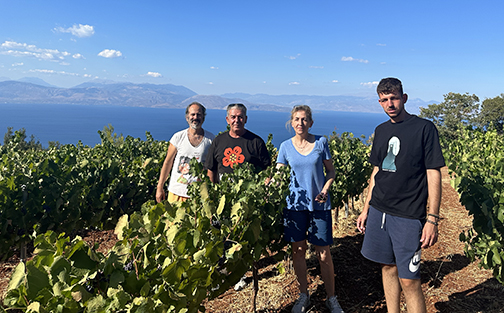 Our vineyards span approximately seven hectares at an altitude of about 550 meters (1,800 feet) above sea level. We cultivate indigenous grape varieties such as Malagouzia, Roditis, and Lagorthi, as well as rare ones like Mavro Kalavrytino, which we use to produce both rosé and red wines. We also grow Muscat, Syrah, and Mavrodaphne.
Our vineyards span approximately seven hectares at an altitude of about 550 meters (1,800 feet) above sea level. We cultivate indigenous grape varieties such as Malagouzia, Roditis, and Lagorthi, as well as rare ones like Mavro Kalavrytino, which we use to produce both rosé and red wines. We also grow Muscat, Syrah, and Mavrodaphne.
(L to R Panayiotis Papagiannopoulos, George, Vasso and Filippos Ligdopoulos)
Tell us about the Peloponnese—where exactly are you located?
We are in southern Greece, but in the northern part of the Peloponnese—a peninsula about 150 km west of Athens. Our winery is located just seven kilometers from Patras and near Kalavryta, a historically significant town where, in 1943, the German army massacred all the male villagers.
Panayiotis, What is your role at the winery?
Panayiotis Papagiannopoulos: I am the winemaker at Edanos Winery.
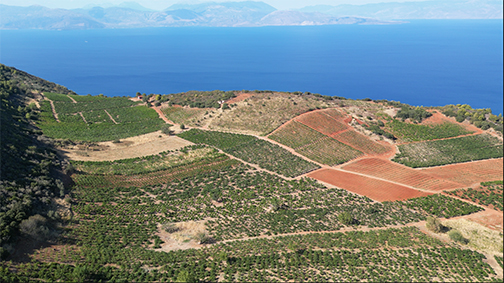 Can you describe the terroir here?
Can you describe the terroir here?
Aegialia, in northern Peloponnese, is one of the six most geologically significant sites worldwide. Our vineyards are located in a nationally protected geo-region with the highest percentage of organic farming in Greece. The area also has the least light pollution in the country and is home to the largest telescope in the Balkans.
The region is known for its pristine rivers—one of which, according to Greek mythology, was where Achilles was baptized to gain immortality. The lush, green landscape creates an exceptional environment for viticulture.
Our vineyards face north, an unusual orientation in Greece, due to a massive earthquake that once separated the Peloponnese from mainland Greece. This positioning allows for a cooling influence from northern winds and protection from the hot African winds, thanks to three towering mountains behind our vineyards. This unique microclimate results in what I would describe as a cool Mediterranean climate.
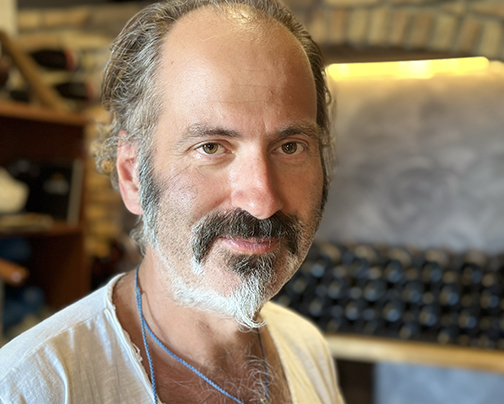 Can you elaborate on the soils and climate?
Can you elaborate on the soils and climate?
Our vineyards have clay-based soils with small crushed rocks on the surface. Beneath, at about 40 to 55 cm deep, lies a layer of calcareous soil, which imparts a distinctive minerality to our white wines, both on the nose and the palate.
(Winemaker Panayiotis Papagiannopoulos)
Which grape varieties do you work with?
Roditis, a pink-skinned grape variety that produces white wine, is the primary grape of our region and the main variety at Edanos Winery. While Roditis is the second most widely cultivated grape in Greece, Aegialia is the only PDO-certified region for it, known for producing the highest-quality expressions.
We also cultivate Lagorthi, a very local white grape variety, as well as Muscat. Among the reds, we are reviving the nearly forgotten Mavro Kalavrytino grape and also work with Mavrodaphne, one of Greece’s most intriguing red varieties.
Tell us about the history of winemaking in Greece.
Greece has one of the world’s oldest wine cultures. While it may not have been the first place to ferment grape juice into wine, it was the first to develop a wine philosophy, commerce protection laws, and a PDO system in antiquity. Wine was not just a daily necessity but a key part of Greek philosophy, gastronomy, and artistic inspiration.
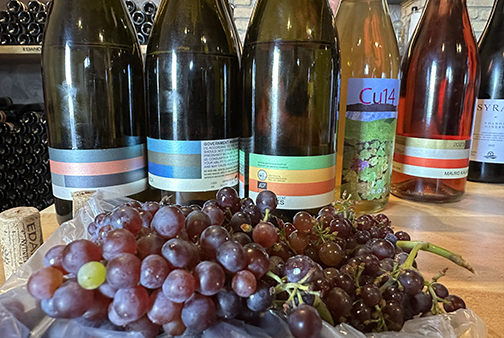 What is your winemaking philosophy at Edanos?
What is your winemaking philosophy at Edanos?
Our vineyards are organically farmed, and in the winery, we take a hands-off approach. We are gradually transitioning from traditional vinification to a more natural style, respecting both the land and the fruit.
Greek mythology and history are deeply tied to wine. Can you talk about that?
Absolutely. Dionysus, the god of wine, was one of the most important deities in Greek mythology. Wine played a significant role in daily life, intellectual gatherings, and even philosophy. Homer referenced wine in The Odyssey and The Iliad.
Just ten kilometers east of here was the ancient town of Aigeira, home to the legendary “ephemeral vine.” This mythical vine would sprout leaves in the morning, grow grapes by midday, be harvested and fermented in the afternoon, and produce wine by evening—a miraculous metaphor for the fleeting nature of life itself.
Even before the Greek alphabet was fully developed, ancient Greeks had three distinct symbols representing the vine, grape, and wine.
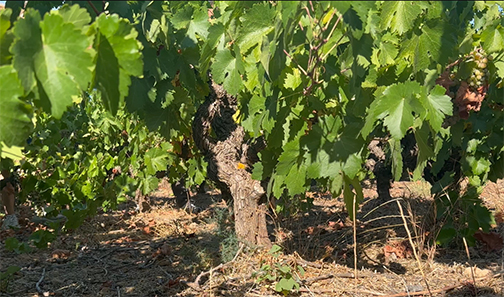 It’s fascinating that many ancient Greek philosophical discussions were held over wine.
It’s fascinating that many ancient Greek philosophical discussions were held over wine.
Indeed. In Plato’s Symposium, profound philosophical ideas emerged during wine-fueled gatherings. However, ancient Greeks believed in consuming wine in moderation, often diluting it with water to sustain long intellectual discussions without clouding their minds.
The Pythagorean Cup illustrates this principle. At the Pythagorean School of Mathematics and Philosophy, potential students were given a cup of wine. If they filled it to the top and drank greedily, their application was rejected. But if they took only half a cup, they passed the first test. This underscores how moderation and balance were integral to Greek culture.
How do you see the future of Greek wine?
I hope to see more organic vineyards in Greece. The climate is ideal for green viticulture, and higher-altitude plantings, as well as those on small islands, can help combat climate change. I also hope to see young vignerons return to their roots and revive forgotten indigenous varieties. It’s not about owning a famous chateau—it’s about understanding that the truth is in the soil.
Greece has over 300 native grape varieties, many still waiting to be rediscovered and vinified in ways that reveal their full potential. The diversity of landscapes and micro-terroirs provides endless opportunities to create exceptional wines. Despite international influence, 92% of Greek vineyards are still planted with indigenous varieties—a testament to our deep-rooted connection to our land and history.














